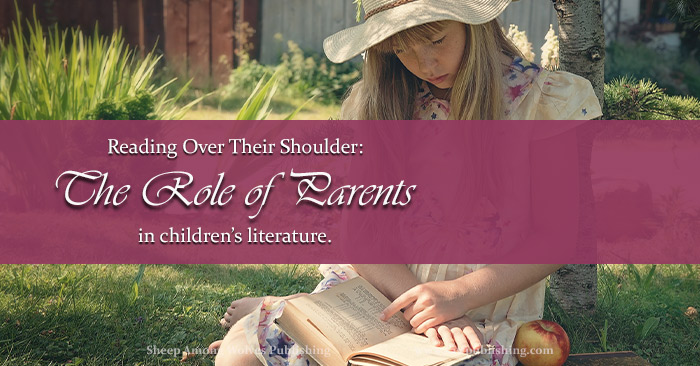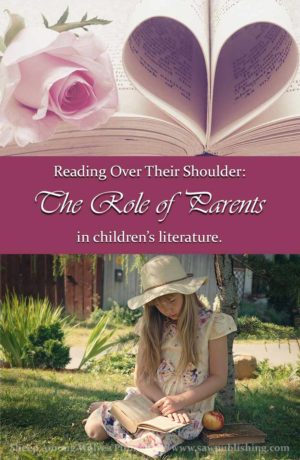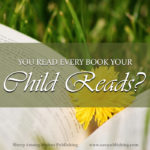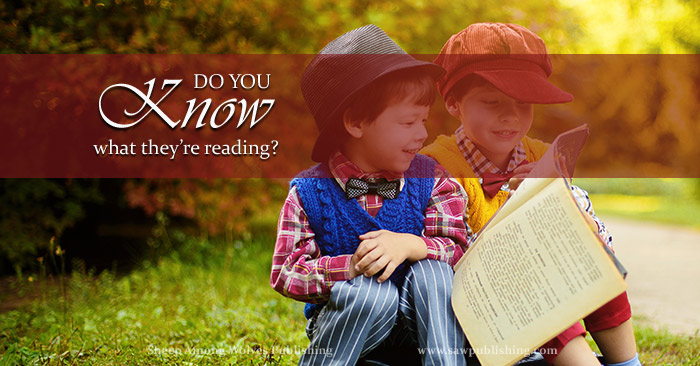Reading Over Their Shoulder: The Role of Parents in Children’s Literature
 Just what is the role of parents in children’s literature? Do parents have a role in children’s literature? After all—kids’ books are for kids!
Just what is the role of parents in children’s literature? Do parents have a role in children’s literature? After all—kids’ books are for kids!
I believe that the promotion of good and great children’s literature is a three-way process: the author has a role, the child has a role—and the parent has a role as well. In fact, the role of parents in children’s literature is a multifaceted one, that includes knowing, guiding, and shaping a child’s interaction with the world of books.
 Knowing What They’re Reading
Knowing What They’re Reading
I read a Victorian novel recently, in which a well-meaning but decidedly self-willed young lady distributes sanitary tracts (i.e. pamphlets promoting healthy sanitation habits) in a poorly-educated lacemaking community. One of the recipients saves her tract for Sunday afternoons, when she plods through it without the least idea whether the subject is religious or secular—but still certain she is doing a good thing.
While we all smile at this exaggerated oblivion, it does illustrate a point. The lacemaker was sure any tract must be good Sunday reading—and failed to notice that the subject had nothing to do with Christianity. In a 21st century world that is increasingly de-valuing literature, it can be easy to be satisfied with the fact that a child is reading. After all, who reads these days?
A book-hungry student is a wonderful thing! But in order to achieve the maximum of that wonderful potential, parents need to know not just that their child is reading, but also what they are reading. Because only by knowing, can you reach the next step of the role of parents in children’s literature:
Guiding How They’re Reading
Reading is more than passively absorbing information—maybe because information isn’t truly something that can just be absorbed. It has to be processed.
Books make children think.
And thinking is a serious thing, especially when you mind is growing as fast as your body. When a parent knows the subject matter of their child’s books, they are in an excellent position to come alongside the child when it comes to the heavy-duty thinking that an effective book sparks. This sounds big, and complex, and theoretical. In practice, it is often little more than just casual talking: talking about a book you’ve both read; talking about what you thought of the author’s ideas; talking about they way they might play out, for good or for bad, in the real world.
Just as you teach your child any other life skill—first by explaining and demonstrating, then by working together, finally with growing independence on the child’s part and a watchful eye still on the parent’s side—so this vital skill of reading (and therefore thinking) is a process. A process in which child and parent both have an active role to play.
Shaping What They’re Loving
This is the ultimate role of parents in children’s literature—the role of shaping a child’s values and love.
Books have a deep impact on how all of us approach the world. And that impact is not just intellectual—it is emotional as well. Think about the books you loved as a child. Some of them were wonderful books, that you would be happy to hand over to your own children. Some of them were simply dreadful, and you hope your child never even lifts the cover. But you’ve got a soft spot in your heart for all of them, haven’t you? You love them now, just because you loved them as a child.
When parents are actively involved in knowing their children’s books, and guiding their children’s growing thoughts, they will almost unconsciously become a part of shaping a child’s values, and their love of good and great literature, as well.
Embracing Role of Parents in Children’s Literature
The role of parents in children’s literature is more subtle than the role of author or child. After all, if the author doesn’t fulfil their role—there isn’t any book (or at least, any worthwhile book) in the first place. If the child doesn’t fulfil their role, the book may exist, but it isn’t going to come off the shelf.
A parent’s role in children’s literature doesn’t make quite such an obvious gap. Parents don’t need to know, guide, or shape their child’s interaction with books, to keep the children’s book market alive and booming.
But if we look beyond the sales figures, and the library lists, and the crowded bookshelves, to a deeper goal that counts children’s literature as a weapon for eternity—then the role of parents in children’s literature is indispensable.
The Christian church needs parents who are passionate about their children’s literature. It needs parents that are committed to children’s literature. In needs parents who are involved in children’s literature. Because the children’s literature of today is molding the Christian church of tomorrow.

Just how much involvement should a parent have in their child’s literature? Should you read every book your child reads? What will be the impact, for eternity?

Hymns and poems connect us to the spirit of a past age in a deeply effective way. In this behind-the-scenes post, we’ll take a look at six different hymns and poems that played a role in As the Heavens Are Higher.

I love drawing on factual details when I’m writing historical fiction. And with today’s FREE download, you can try out Adelaide’s Queen Cakes recipe right in your own kitchen.
- By This Shall They Know – Cover Reveal!
- Behind the Scenes of By This Shall They Know—The Real Maple Creek

